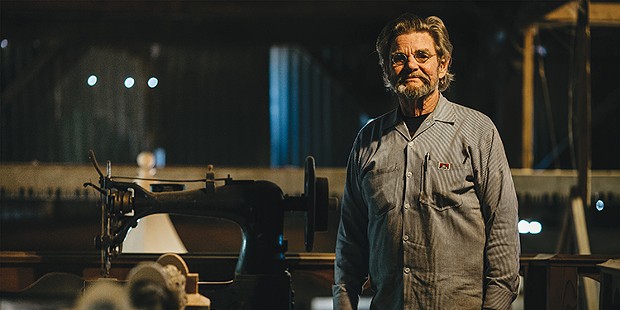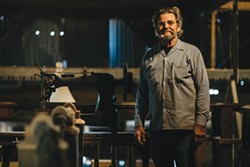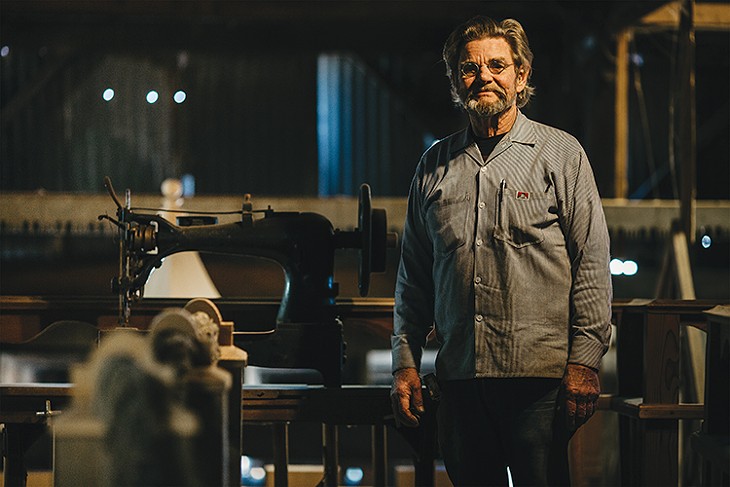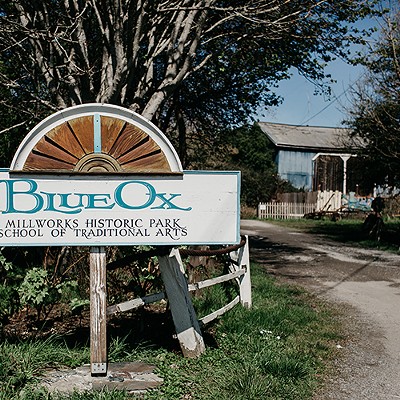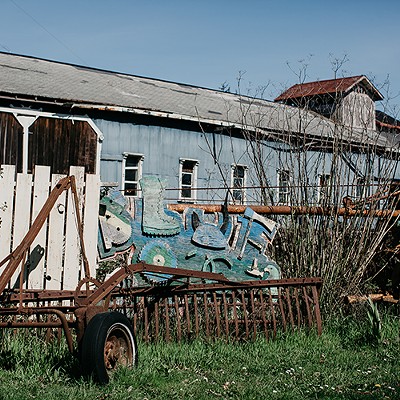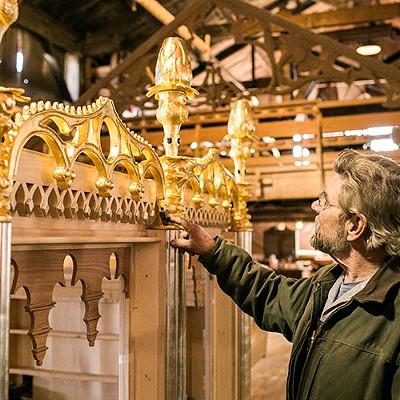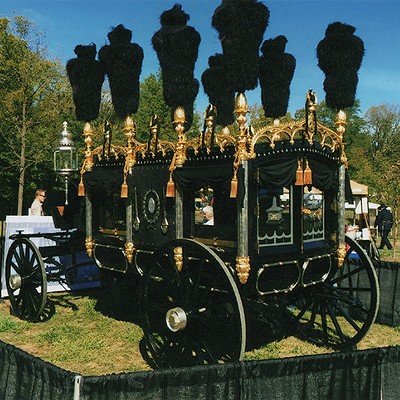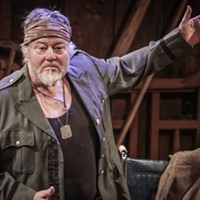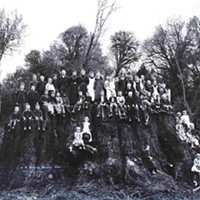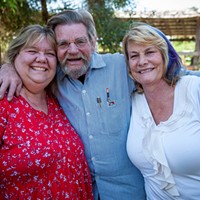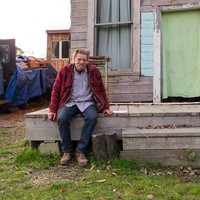[
{
"name": "Top Stories Video Pair",
"insertPoint": "7",
"component": "17087298",
"parentWrapperClass": "fdn-ads-inline-content-block",
"requiredCountToDisplay": "1"
}
]
"This play is so important. I've never read anything like this."
"Same shit, different war"
"My father. My uncle. My sister."
"You gotta get through it somehow."
"It's a tense time right now."
"It ain't just a woodworking shop."
"PTSD."
"You gave words to something I experience every day."
"I feel this enormous weight."
"Thanks for laughing occasionally."
"That was a good cold reading."
"Damn, honestly? I'm gonna go have drinks."
"I'm Eric Hollenbeck. I was the radioman."
Pieces of conversation sail across a hot room during the second reading of Radioman, a visceral monologue-style play born from the poetry of Vietnam combat veteran and Eureka native Eric Hollenbeck. The reading is at Art Share, a hip and grungy multifunctional space in downtown Los Angeles' freshly gentrified Arts District. Graffiti litters the neighborhood; spray paint color blooms along streets and sidewalks and across brick walls reaching up to the blue Southern California sky.
The play's director, assistant director, writer, producers and publicist are assembled, along with eight actors and a collection of folks from theater companies engaged in this wildly collaborative production. After a flurry of introductions, everyone gathers around big tables pulled into a circle.
Recently transplanted New York playwright James McManus checks in with the actors. Unlike other readings, in which a script is rehearsed ahead of time, this is a cold read. McManus says this way he can hear the imperfections in his writing. "Sometimes," he says, "the actors are so good that they can make bad writing sound OK."
McManus explains how he wants the different verses of the monologues to go down. He has merged Hollenbeck's poems with stories from other war veterans. The result is a series of biting, dialect-heavy monologues punctuated with refrains and one-liner conversations that come like a rapid fire ping pong match. He slaps the table with a flat palm, urging the actors to dig in and find the cadence to his writing.
"Read them one line after another after another on top of each other as much as possible," he says. "Do the best you can, then go ahead and let that fly."
The monologues begin with the radioman — Eric Hollenbeck — in the jungle in Vietnam smoking a cigarette and cradling a dead soldier's leg. The piece then takes off into the wilds of the human war experience, from Vietnam until now. The actors read in turn. Soon they pick up the gritty, thumping rhythm of McManus' words. There is ache, anger, grief and humor. There's also hope. It's almost musical at times, as voices echo along the brick hallways of the old industrial building.
The Radioman
Hollenbeck's stories first fell together 20-some years ago, when he wrestled his experiences as a young soldier into a series of poems titled, Uncle Sam's Field Guide to Southeast Asia. Technically, Hollenbeck didn't write the poems. Instead, he spoke his words into a cassette player. "I dropped out of school when I was 14 and went to work in the woods," he explains. "I can't read."
Called up for the draft at 18, Hollenbeck spent seven-and-a-half months straight on the frontlines. "I was in the heaviest combat in Vietnam," he says. "We were in the jungle the whole time."
Discharged early because his father died, Hollenbeck was suddenly sole provider for his mom and younger brother. He says the transition home was rough. Within 72 hours of being pulled out of enemy fire, he found himself standing in his mother's kitchen, his interior landscape — his life — forever changed. "I got home Saturday night and went back to work in the woods at 5 o'clock Monday morning."
He exhales a plume of pipe smoke. "I remember my mom saying one time that 'Eric never did come home.'"
Back in 1973, after a self-proclaimed meltdown and months of drifting, Hollenbeck bought a piece of derelict property on Humboldt Bay with a $300 bank loan and a leap of faith from the local building department. Over the years, with wife Viviana by his side, Eric's salvage logging company evolved into Blue Ox Mill and Historic Park. Today, Blue Ox encompasses a full production millworks shop, smithy, foundry, apothecary, print shop, ceramics, stained glass and fabrics studio, working history museum, radio station, nonprofit organization, high school for at-risk teens and a program for war veterans.
One of only eight remaining Victorian mills in the country, Eric says it's the most complete job shop in the United States. While other mills have specialized, Blue Ox still does it all. Its high-end, historic reproductions can be found in mansions, museums and churches in every state of the union — everywhere from the White House to the Mascot Saloon in Skagway, Alaska. His list of accomplishments is 44 years long. "If you're in the business," Eric says, "you know Blue Ox."
Adding to their broad catalogue of endeavors, the Hollenbecks are now co-producing Radioman. Like everything they've taken on in 40 years of marriage, Eric and Viviana are working in true partnership. "I build the car and she puts the wheels on it," Eric likes to say.
McManus included a monologue in the play from the perspective of the radioman's wife. He is careful to not be syrupy about their relationship but he gets it. "Jesus, I mean, he ends where she begins and visa versa," McManus says. "I don't know who either of them would be apart. ... They joke with each other, they bust each other's chops, they lean on each other."
Viviana is McManus' touchstone when he interviews Eric. "She's always who I go to to see whether I'm pushing him too far. Whether he needs a nap. Whether I need to pull back. Whether I need to bring out more beer or less beer," he says.
"Can you help to find a part of me worth loving?" reads a devastating line in Radioman, one that hits home for Viviana. Her life with a veteran has not been easy. She says post traumatic stress disorder takes its toll over the years. By giving the audience a view through the window of life with PTSD — the sleepless nights, the distance and the distraction — she hopes the play will increase understanding and inspire a shift in perspective on the challenges vets and their families face.
The Hollenbecks are frank about the difficulty of revisiting Eric's war stories to develop the play. Each step of the way, he has had to process what happened in the jungle all those years ago. "I can tell you from the inside that this has been pretty excruciating," Viviana confides, tucking a strand of auburn hair behind her ear. "But Eric is in it for the good that might come out of it."
For him, the project is about educating the American public about the real cost of war. He defers to the last stanzas of his poems to sum up his reasons for this undertaking:
And, as for the justness of any war
One must never forget
War is as far from Godliness
As we as humans can get
Thus, pick this option carefully
With the weight of a heavy heart
For sanity is the casualty
The minute War does start
Soldiers often spend a lifetime coming to terms with what they experienced on the battlefield. Eric says in order to survive in war, you have to go crazy. "At some point, every soldier breaks," he explains. "And when you break, everything's changed in your head. Everything's different."
When that internal spring gets bent too far out of whack, it can't ever be bent back into place in quite the same way.
"When the fight or flight mechanism gets broken," Eric says with conviction, "there is no flight."
When asked how he "broke," Eric curls into himself a little bit. He slurps on his cup of cold coffee. Part of him seems to leave the room and he replies bluntly: "Third day in country. That's when I broke. It was when I dug up that dead kid and I started to cry on the jungle floor."
Eric's own healing lies in helping others.
"I've walked a mile in those boots," he explains. "I understand."
"You know that saying," he continues, "'What doesn't kill you makes you stronger?' Well, what does that mean?" He coughs a deep, smoky cough and continues. "Does it make you physically tougher? Well, that could be part of it. Does it make you wiser? Well, that could be another part of it. But I think it gives you empathy and therein lies your strength." He pulls apart his pipe and scrapes it clean with a pocketknife. "It's when you can really understand somebody else because you've walked the same path."
He says if Radioman can help that one soldier to heal or give one civilian family member at the back of the theater some understanding of what it's like down in the rabbit hole, it's worth it.
He also feels a lot of pressure to get it right; to honor his platoon of 28 guys with dignity. "It's not just me," he explains. "If it was just about me, it'd be a whole different bag of puppies."
How It All Started
Before the reading, the Hollenbecks are down the block from Art Share, eating pie and visiting with the staff of the Cornerstone Theater Co. Eric isn't as nervous as expected. In fact, he's got his hair slicked back and is wearing a neat, black polo shirt with the 101st Airborne emblem embroidered on it. He seems in his element — perky even. As a rule, though, he doesn't like leaving home and when he does, he tracks the journey back to Blue Ox in his mind overland. Just in case. He jokes he can't have the hazelnut creamer in his coffee because that's what they have at the shrink's office.
When Cornerstone hosted a community theater project at Blue Ox several years ago, Eric and Viviana got to know producer Lester Grant. One day, Eric and Viviana pulled Grant into their office, fed him lunch and showed him Eric's poems. Viviana told him about her vision of turning them into a play, adding stories from other vets and structuring it something like The Vagina Monologues.
The poems took Grant on a journey that made him see veterans in a whole new way. "It filled in the blanks for me. And so I said, 'You know what? We should do this,'" he says in his warm Caribbean accent. He smiles. "This was the beginning of the journey of Radioman."
First, they needed to find a really gifted playwright. Grant, who is producing the play alongside the Hollenbecks, says he didn't just want it to be an actor up on stage "spouting beautiful things that people want to hear." He wanted it to be real.
Grant had just the person in mind. No stranger to writing the hard stuff, McManus developed a play for Cornerstone called Love on San Pedro that sent him to L.A.'s Skid Row to explore stories of homelessness. McManus already knew the story circle format, and Grant says he turned Love on San Pedro into a true voice of the people while, at the same time, maintaining theatricality — a hard balance.
"He came to my place and we sat down and I told him what the concept was and his eyes were like saucers," Grant remembers. "He said, 'Listen I'm from Pittsburgh, my town was decimated because of the war and the men who came back so broken. I have to do this project.'"
The Playwright
Settled in at a sidewalk cafe on Melrose Avenue, McManus wears his signature Irish flatcap. With the big brown eyes of a little boy and the voice of a morning DJ, he reflects on that first meeting with Grant.
"When he told me it was based on a book of poetry by a Vietnam veteran, I was kinda like, 'I know this story. I know these people.'"
McManus says his home town was one of those places where it seemed like every other guy went to Vietnam and if they weren't in Vietnam, they were working in the mill to make the munitions for the war. He says the soldiers came back "either dead or so fucked up that they weren't even recognizable anymore."
"The war tore the area apart and left it with a psychic wound. The place has kind of never gotten over it," he continues. "Saigon fell in '75 — that was 42 years ago and it's still a fresh wound in Western P.A. It's still the thing that you don't bring up unless you want to have an argument at the table."
When McManus first read Eric's poems, "five or 10 times through," he found an enormous amount of heart in them. Intrigued, McManus wondered, "Who is this guy ripping his scars wide open and bleeding onto the page?"
McManus headed up to Humboldt to meet him. He pulled into town late and stayed a few blocks from Blue Ox. On his walk over the next morning, he was struck by the similarities between Eureka and the broken steel towns of Pennsylvania. "The industry is different. The people are different. Maybe the demographics are different," he observes. "But the wounds are all the same."
It took no time at all for the two of them to click. McManus says. "Eric starts taking me around the Blue Ox and within five minutes, I'm like, 'I love this guy!' He reminded me of every uncle that I'd grown up with."
Except those guys didn't write poetry.
"Where I grew up, if you talked about art, you'd get your ass kicked," he says. "Eric's this tough guy, and then at the same time you can feel that there's this big beating heart there. And he's going to show you both of these things at the same time."
McManus is animated when describing his few days getting to know Eric, Viviana and Blue Ox. "I was totally taken by the the place within hours," he says with palpable enthusiasm. "It's got a smell to it. It smells like sawdust and cigar and sweat. It's as gritty as all get out and then at the same time, here comes a bunch of school kids. And he's going to take them around and show them what it looked like to blacksmith in 1876 or whatever. I'm like, 'Shit!'"
McManus had questions about the poems, he wanted to know about the Ox, he wanted to know the stories that aren't in the poems. He'd had experiences with men from Eric's era, and worried it might not be easy to get him to open up. But when the two of them hunkered down in the warm, cluttered back office of Blue Ox, Eric pulled out a few cans of warm Pabst Blue Ribbon, lit his pipe and did one of the things he does best: tell stories. They sat together for six hours at a time, "or as much as he could take that day," McManus remembers.
Story Circles
After immersing himself in the vortex that is Blue Ox, McManus and the play's assistant director, Daniel Penilla, headed north to gather more fodder for the monologues. They hosted story circles with veterans in Medford, Oregon, and in Eureka. McManus reckons they interviewed 150 or so male and female vets from the Vietnam War, and the wars since.
He jokes that the gatherings were not unlike AA meetings — with coffee and doughnuts and chairs strewn in a circle, and also a sense of brotherhood. Some vets didn't say a word. Others spoke of their experiences for the first time. "There were always the talkers and the non-talkers," says McManus, "and you'd wonder what the non-talkers were thinking."
"The thing that I learned right away is that whatever your preconceived notions of what a veteran is, it's all out the door," he reflects. "There are no monoliths. Some of them are angry as all get out. Some of them are kind as all get out. Some of them are that wonderful mix in the same person. It's beautiful. ... They're just people. They're trying to fall in love, they're trying to keep a marriage together, they're trying to not be an absolute shit stain to whoever their partner is. They're just trying to be in the same way that all of us are trying to be.
"A lot of the veterans had this idea that they may have left a better version of themselves in the desert and they're never going to get that better or more naive version of themselves back," McManus continues. "But they said, 'This is who you have sitting in front of you, so if you want me to tell you what this is like, I'll tell you what my life is like.'"
Identity
Almost all of the monologues are about identity, the ways in which vets work to distance and redefine themselves from the person they were at war. McManus marvels at how they do it. "I have trouble getting myself out the door to go to the gym — and these folks are trying to figure out a new way to navigate the world every day," he says. "They're becoming new people all the time."
The same was true of Eric, McManus says. "He knew who he was when he was a radioman and when he came back, he had no idea who he was."
In the decades since his return from Vietnam, Eric has fought to resurrect his identity. "I'm a craftsman," he attests. "But you can't never replace the soldier. It's burned in there."
"For 44 years, I built all of this and worked seven days a week to not have to think," Eric continues. "But it doesn't matter how far or how fast I've run; that damned shadow is right there."
With this in mind, he and Viviana started a program at Blue Ox in 2014 to help veterans redefine themselves after coming home from war and to teach them to build something they can hold up to the world at large and say, "That's me. I did that. That's what I do."
"All they need is a new identity," insists Eric, with the urgency of someone who yearns to pass on the perspective of a hard lesson learned. "The minute they find out what they're good at, they're like an old engine: You dink with 'em and dink with 'em and the instant they fire off, get the hell out of their way! Everything about that engine wants to run."
In 2015, working from the only known photograph, Eric and his team of veterans from every branch of the military built a historically accurate reproduction of President Abraham Lincoln's hearse for the commemorative 150th anniversary parade honoring Lincoln's burial. The vets and their families were flown out to Springfield, Illinois, where they saw 150,000 people line the streets to see the hearse they had built.
"Only veterans could have done this," Eric says. "The project was hard, and complicated, and the perfect job for veterans because, for them, retreat is not an option."
He runs a hand through his beard, peers over wire spectacles and launches into a detailed explanation of the cope and drag mechanism used to create the decorative aluminum castings for the hearse. The most difficult casting they made gave them fits, Eric says, "12 days of miserable failures. I'm not talking close — I'm talking miserable failures. I'm not talking one casting a day, either. I'm talking two, three, four tries every day for 12 days straight. But because they were veterans, retreat was not in the vocabulary. They went back for that 13th day and nailed it."
For the vets involved, Eric says the hearse project was life changing. "It was the first time some of these guys and gals had done something really good for society and didn't have to use a gun to do it."
Hope
The hearse, and what it represents as an opportunity for hope and healing, has its own part in the monologues. From the beginning, the Hollenbecks and Grant impressed upon McManus that the play had to end with hope. "We have no interest in annihilating people," Grant says. "Eric and Viviana strongly feel there's a different type of voice that needs to be heard from veterans, one that's so real and so raw — but we also don't want folks to walk out of this play bleeding through the eyes. This is what we told the playwright — we want them to walk out with hope."
Eric has spent some time worrying about McManus. "He's been blasted with too much. I apologized to him at the very beginning of this — and I have apologized to him over and over and over since." Eric warned McManus about the rabbit hole: "You are gonna have to go down there with us. And that's really, really tough but now, you gotta dig yourself back out of the rabbit hole and wrap this thing up. You can't wallow around down in there, none of us can."
When asked how it feels to carry all of these stories, McManus admits there have been some tough moments over the course of writing Radioman. "There are times," he says, "when it feels very dark, but I always have the Ox as the lantern."
Finding the balance in his writing has been tricky. "I want this to be a hopeful play but how do I do that while at the same time representing the darkness?" he asks, adding that the vets emboldened him to not sugarcoat their stories.
"Because if somebody came to see this play and people were like, 'Oh, it's not too hard being a veteran. They don't live with too much.' I would not represent Eric, the poems or all of the other veterans I've talked to unless the play was dark, dark, dark, dark. I can only go that dark because the light is equally bright at the end of it."
As hard as it's been, McManus says, "it's an absolute gift to be able to write a story that has hope without it being mawkish. Or bullshit — like this isn't bullshit hope. This isn't saccharine hope. These are people who have gone through everything that nobody should go through and still found a little bit of humanity at the end of it."
Along with hope, there had to be humor. "We're gonna have to work as a team — directing and acting-wise — to let the audience know, very early in the play, that they can laugh at this stuff," McManus says. "We have to. Otherwise, it's gonna be 90 minutes of a sad hammer hitting them over the head. And that's not an enjoyable night of theater."
"Also," he adds, "that would not be true because these vets that I meet, they're hilarious. ... They're constantly busting each other's chops. They come up with the worst jokes that you could imagine."
Another vital component of the Radioman project is follow-up. "This is a very real piece. James did not pull punches," Grant says grimly. Depending on where vets and their families are in their healing, watching the play could be rough. "For some, it will be a soothing balm," he says. "But for others, we're going to be ripping bandages off."
To answer this, there are plans for a letter writing program to help veterans process anything that might come up after seeing the play, and to encourage ongoing dialogue as vets ease out of the project. The Radioman team will also leave funding after the play moves through each location to provide a space for vets to come together, sort through their experiences and even create story circles of their own.
Reading
At Art Share, the whir of fans deadens hammering from the studio next door where a collection of edgy artist types hang paintings. During the hours it takes to hear the second draft of the monologues, Eric's crooked, bruised fingers hold the small space of Viviana's back. When the actors finish reading, it's dark out but still hot. Tied in that moment, people don't seem to want to leave and pull their chairs closer into the circle. McManus, who feels an immense weight to get these stories right, invites feedback. As the conversation travels around the table, there is laughter. There are also tears.
"This touches everybody," says one of actors, pushing a dreadlock over her shoulder. "It's not just about physical war. It speaks to wars in our personal lives, too — wars like race and domestic violence." There's a certain universality to Radioman. Another actor says it speaks to the bones of a phenomenon that — in one way or another — touches all of us. It's important. It's powerful. And the timing seems to be right. McManus reckons it's in the zeitgeist.
The discussion is cut off to free up the studio for the next thing. Folks hang around in the hallway. Some drift off in groups to have dinner. McManus heads home with his notes to process the experience and start the third rewrite.
He says he usually has one of two thoughts after a reading, "One is, we have a play. Or, we don't have a play." This time he thought, "Oh, we got a play here."
Radioman will launch its West Coast tour visiting Medford, Eureka, San Francisco, Salinas and Los Angeles in spring of 2018. Its producers hope a national tour will follow.
Portions of this reporting first appeared in the Spring 2017 edition of the Humboldt Insider.
See more photos online at northcoastjournal.com
more from the author
-
NCJ Archive: The Journey of Radioman
- Nov 11, 2020
-
'In the Interest of Justice'
Decades after leaving the jungle, Eric Hollenbeck is awarded three Bronze Service Stars
- Dec 14, 2017
-
The Spirit of a Place
Jerry Rohde finds and tells Humboldt's story
- Oct 26, 2017
- More »
Latest in News
Readers also liked…
-
Through Mark Larson's Lens
A local photographer's favorite images of 2022 in Humboldt
- Jan 5, 2023
-
'To Celebrate Our Sovereignty'
Yurok Tribe to host gathering honoring 'ultimate river warrior' on the anniversary of the U.S. Supreme Court ruling that changed everything
- Jun 8, 2023
